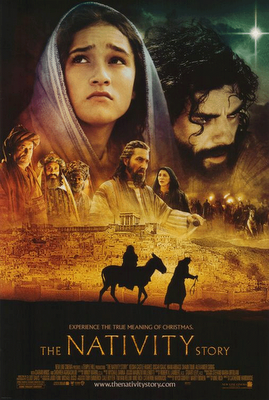 My uber-talented friend, Susan Britton (who’s authored one novel and has another on the way) went to a pastor’s screening yesterday of New Line’s The Nativity Story, a film this blog has been closely following. Bottom line? A beautiful film with a few chinks. Here’s her take—enjoy:
My uber-talented friend, Susan Britton (who’s authored one novel and has another on the way) went to a pastor’s screening yesterday of New Line’s The Nativity Story, a film this blog has been closely following. Bottom line? A beautiful film with a few chinks. Here’s her take—enjoy:I found The Nativity Story basically absolutely beautiful and faithful to the biblical account. The script fudges and makes allowances for dramatic needs, but these add to the story in believable and interesting ways, unpacking just what it would have been like for Mary to be preggers without a husband in a strict Jewish village. And there are snippets of things that will figure into Christ's story, such as crucified men (rebels Herod is getting rid of) and a scene where Joseph and Mary buy a fish and eat it on the shores of the Sea of Galilee.And there you have it. If you’d like to know about the film, see BibleFilms (and Matt’s latest update), Christianity Today, Queen Spoo’s blog (great site) or this blog’s coverage.
The casting and acting are great. Mary and Joseph (Keisha Castle-Hughes and Oscar Isaac) are both beautiful to watch. Castle-Hughes has a nontraditional earthy beauty that really works for Mary, who is portrayed as a very real person in this story. She spends much of her time looking worried. She goes to Elizabeth's for the reassurance of seeing for herself that what the angel told her was true, that Elizabeth is pregnant. And at first, Mary doesn't even want to be betrothed to Joseph, but she slowly falls in love with him, a sweet and touching love story. Also, the cinematic representations of God are all low key and un-hokey. And Herod is totally and appropriately creepy and incredibly hard of heart, and so is his son. The wise men are the happiest people in the movie—I liked that touch—very self-assured and king-like and often funny.
The settings are gorgeous. Mary and Joseph and the wise men undertake their respective journeys against great barren landscapes of stone and shifting sand. The village of Nazareth is satisfyingly built of rough stones with people crowded into tiny rooms. The villagers are always busy, making cheese, pressing out grapes. The film goes with the theory that the Star was really the coming together of three heavenly bodies (I think two planets and one star)—a once in every 3,000 years occurrence—and as the film unfolds, the stars are shown again and again in the night sky, coming ever closer together.
I found the film a trifle ponderous and slow in places, especially in the beginning (not the very beginning, in which Herod slaughters all the babies in Bethlehem, but after that). I wish the pace of the movie were a little faster, especially the first third. Also, the music seems to be all long, drawn-out chords that seemed to say “isn't this all terribly important,” which adds to the overall ponderous effect.
It seems to me it would be just about impossible to make a good movie about this very familiar and dearest of stories. Yet somehow, by making Mary and Joseph very real people, what God did through them seems even more wondrous. The movie ends in Mary's voice, speaking the Magnificat over images of herself, Joseph and baby Jesus traveling on their donkey over sand dunes to Egypt—a lovely and resonant finish.
(Images: New Line)